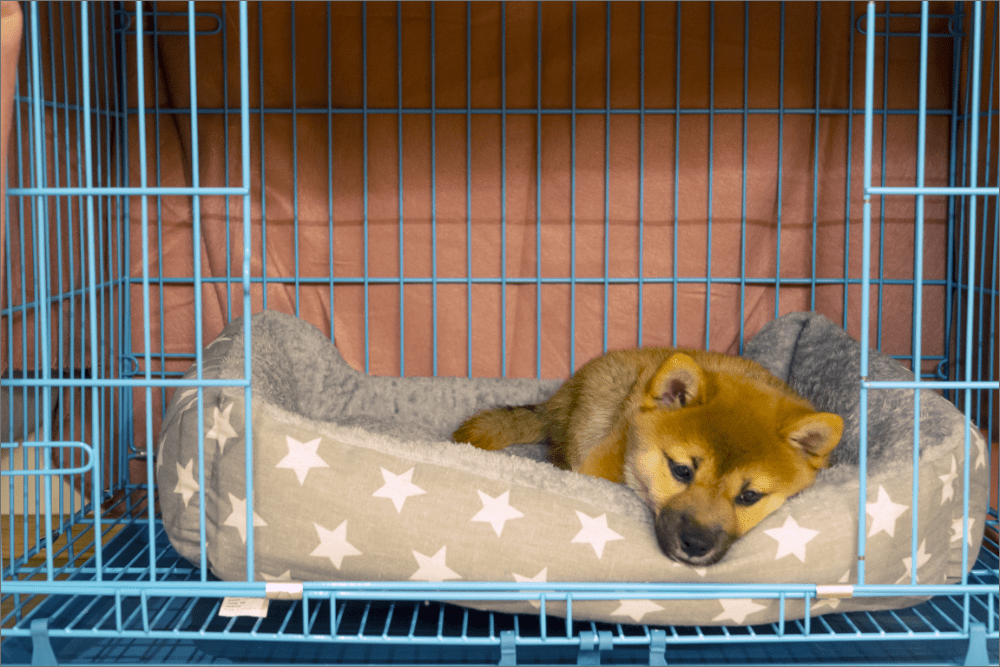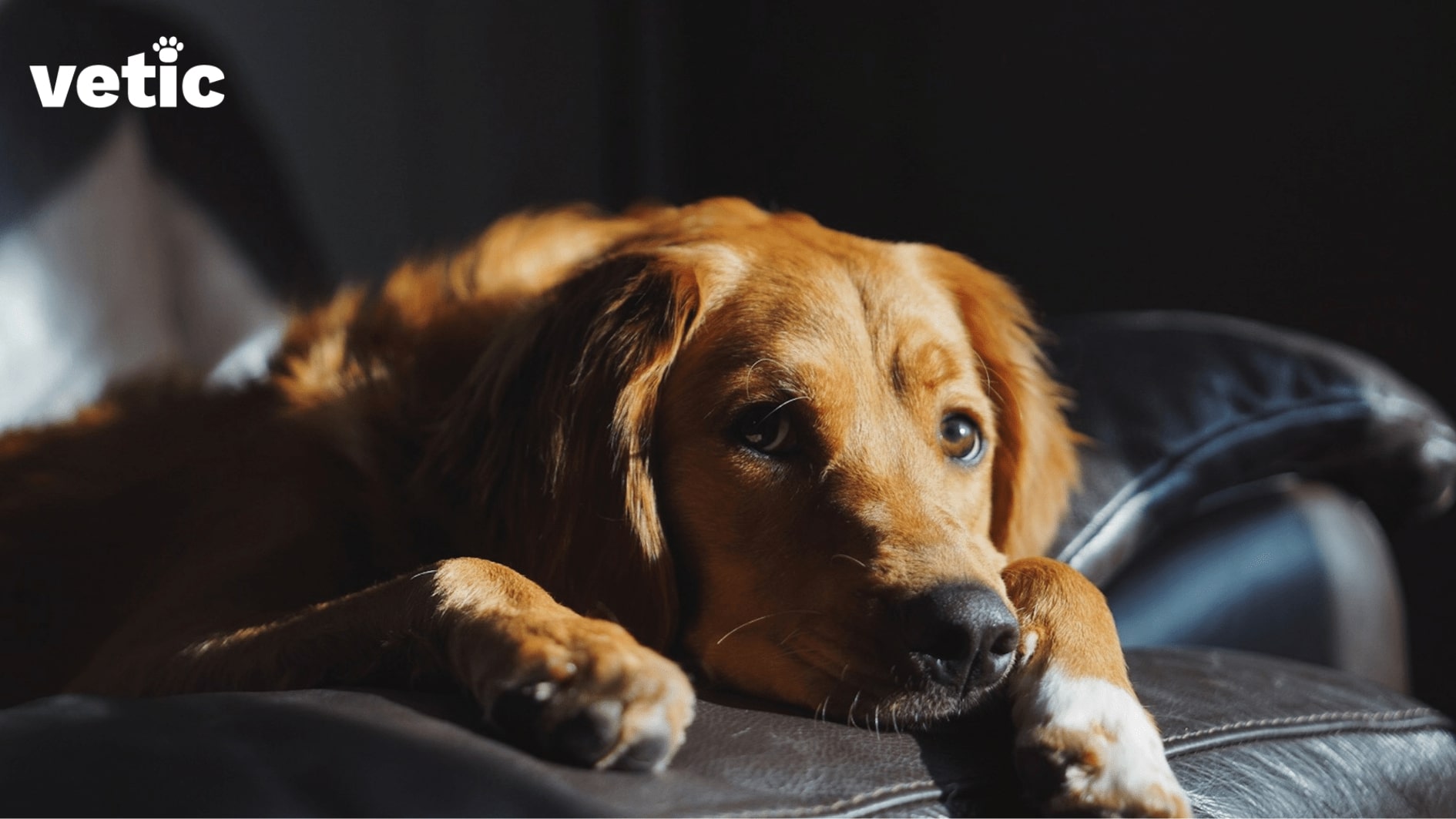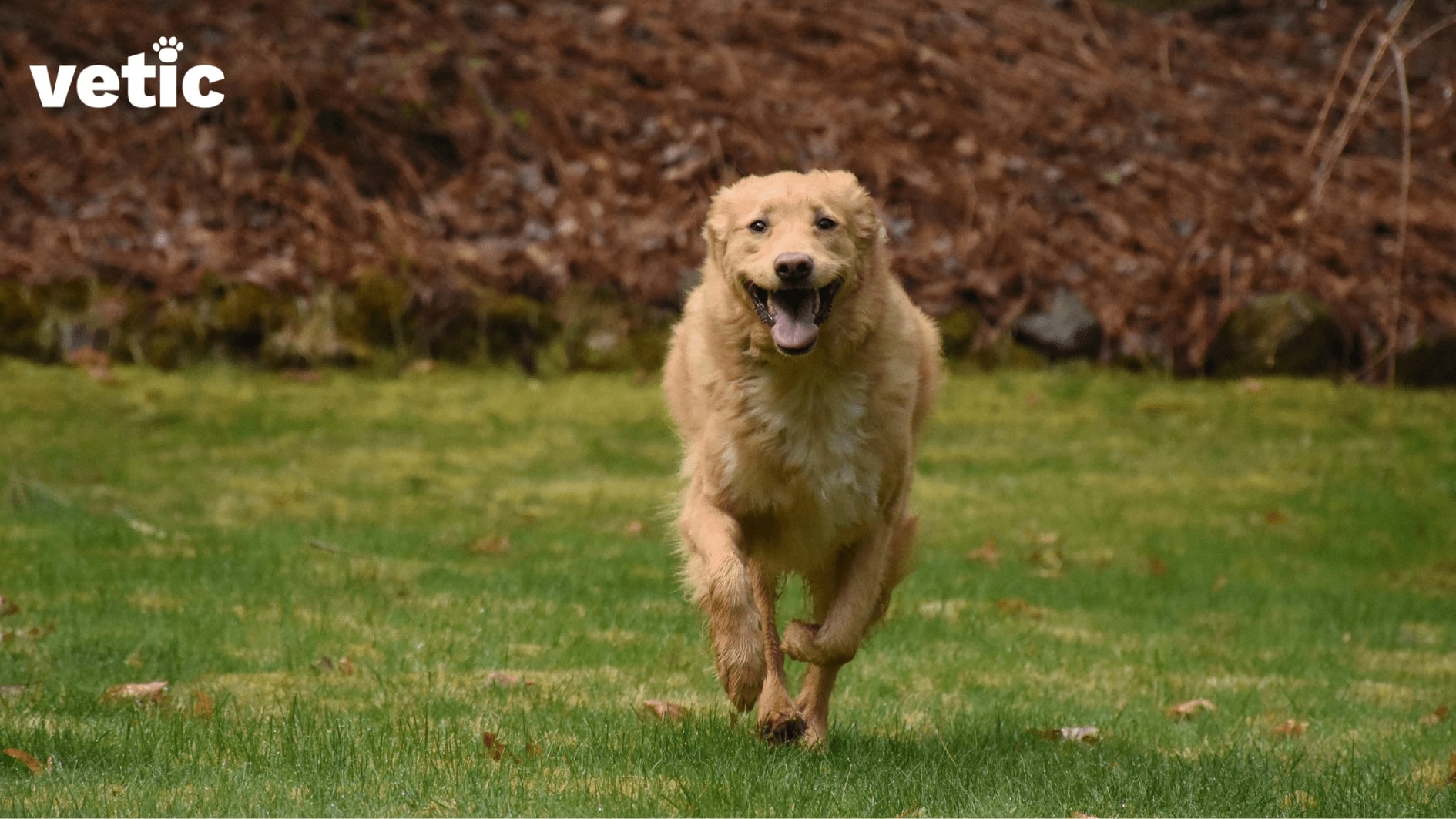Are you tired of coming home to destroyed furniture, chewed-up shoes and destroyed cushions? Does your dog have frequent “accidents” while you are away from home? Do your neighbours complain about your fur babies howling and barking?
These are all signs of anxiety in dogs. If your dog is behaving similarly, you need to consider treatment and/or training to lessen their agony.

What are some other signs of anxiety in dogs?
Here are some of the most telltale signs of anxiety in dogs –
- Unprovoked growling
- Unprovoked aggression (towards humans and other animals)
- Destructive behaviour (chewing on shoes, furniture, pillows and scratching doors)
- Tendency to escape (when left alone)
- Excessive barking, howling and crying when alone
- Compulsive behaviours (pacing constantly, over-grooming and self-scratching)
- Depressive signs (decrease of appetite, will play and overall energy levels)
- Excessive drooling (most common in travel anxiety – it can be a sign of anxiety)
- Changes in body language (a confident dog can suddenly begin to tuck his tail between his legs, fold his ears back and bare his teeth)
- Soiling the house (anxious dogs can end up pooping and peeing inside despite being housebroken)
- Trembling (it can happen during thunderstorms, vet visits and meeting new people)
If you notice more than one of these signs in your dog, you should consider visiting an experienced vet near you and avail anxiety treatments for your dog.
Some breeds are more prone to anxiety than others. These breeds include Labrador Retrievers, Golden Retrievers, Collies, German Shepherds, and Indian Spitz. However, almost all dogs are capable of experiencing and showing signs of anxiety.
Visit Vetic and speak to our veterinarians to learn more about the management of anxiety in dogs with medication and behavioural modification.
What are the different types of anxiety in dogs?
Just like human beings, dogs can feel anxious. There are different types of anxiety depending upon the cause and duration.
Some of the most common types of anxieties in dogs include –
Separation anxiety in dogs
It is one of the most common types of anxiety we see in city dogs. A majority of families in the cities have to leave for work or school leaving their pups at home for at least 8 hours a day.

Things get especially difficult for your dog immediately after long weekends and vacations. It’s difficult for them to understand why their humans spend a few days home only to leave them alone again.
Fear-induced anxiety
Just as some people are scared of thunderstorms and loud firecrackers, your dog can be afraid of them plus other loud noises.
Fear and anxiety are different. The easiest way to understand anxiety is to think of it as the fear of fear. It is the anticipation of the objects that causes fear. Not knowing exactly when the lightning will strike or the cracker will burst causes apprehension, dread and stress to work together. That uneasy feeling is fear-induced anxiety.
It’s common to notice this in dogs during Diwali and other festivals with loud music and/or firecrackers.
Social anxiety in dogs
Social anxiety in humans and dogs is quite similar. Many do not feel comfortable being in the company of unknown people. We typically call them introverts.
Your dog might be an “introvert” as well. We know how much you want your dog to meet other dogs, make friends and frolic in the doggy park. However, your dog may not be open to that idea.
Sometimes, socialising dogs from a young age helps them overcome their social anxiety. However, if your dog is no longer a puppy and he clearly shows an aversion towards other people and pets, it’s better not to force socialisation on them.
Environmental anxiety
Environmental anxiety can affect your dog if you have been moving around. Your pooch has, maybe, lived in 3 different homes with 10 different people and with each move, his boarding facilities have also changed.

The lack of environmental consistency in his life can induce anxiety induced by constantly changing homes and faces. It is very common to notice this in dogs who have spent their lives in one or more shelters.
Travel anxiety in dogs
Travel anxiety is probably the most common type of anxiety we have seen in all dog breeds. Whether your dog is an imposing mastiff or a cutesy pug, travel anxiety may bug him.
We have observed, dogs who have been travelling with their humans since they were little puppies tend to show fewer or no signs of travel anxiety.
It is not as concerning as the other types of anxieties we have discussed here. Nonetheless, if you are going on a long road trip, or planning to take your dog on the train or flight, you may want to speak to our veterinarian about it.
How to reduce dog anxiety?
You may be looking for a cure for anxiety in dogs. Anxiety is generally a chronic problem unless discernible causative factors are present. Anxiety due to thunderstorms, loud noises and travelling are typically not considered chronic conditions.
Now that you know about the different types of anxieties and their causes, let’s explore a few anxiety supplements for dogs that can reduce anxiety.
Medicines and Supplements for dog anxiety
First, we will talk about a few supplements and medicines that may help reduce your dog’s anxiety. However, these are only short-term options and you should not continue them for long durations without consulting a vet.
Speak to your vet or reach out to us at Vetic for complete advice on managing your dog’s anxiety issues.
Hemp oil and CBD oil for anxiety in dogs
You can now find Hemp and CBD oil supplements at Vetic stores as well. These are natural and effective anxiety supplements for dogs to reduce anxiety.
Most importantly, CBD oil also has anti-inflammatory properties. So, if your dog is old, it can help them overcome joint pain, aid digestion and reduce anxiety.
CBD oil supplements at Vetic are 100% natural and organic. You can get them without the prescription of a vet. These are over-the-counter (OTC) because they are highly safe for all breeds and ages.
Anxocare
Anxocare is a well-known product by Himalaya. In the past decade, several dogs have benefited from the anti-depressant and calming effects of tablets.
Several pet parents have also found it to be quite useful in reducing the aggression of their dogs.

Anxocare is a purely herbal calming tablet for dogs just like other Himalaya products. However, you should consider the opinions of a vet before starting any new supplement. An experienced vet can prescribe the correct dose according to your dog’s body weight and anxiety level.
It is an over-the-counter (OTC) veterinary medicine that is easily available at any Vetic store. Or, you can get it delivered to your doorstep by giving Vetic a call. Download the Vetic app to know more.
Poochrex
Poochrex is an incredibly powerful relaxant. It can address –
- Severe anxiety issues in dogs
- Acute pain related to injuries
- Surgical pain
It is a muscle relaxant and anxiolytic. Each Poochrex calming tablet contains natural extracts from valerian root, magnesium, amla, rutin and fungal and bacterial proteases. Therefore, it is a strong muscle relaxant, pain reliever and calming agent.
So, before you give your dog Poochrex, find out if it’s the appropriate product. Any dog suffering from anxiety due to health and medical issues, or age-related problems, can benefit from Poochrex muscle and mind relaxant tablets.
These tablets are a little more difficult to find in stores. You can find them at high-end pet stores. Visit or call Vetic to get your hands on Poochrex anxiety supplements for your pet.
Calmex Dog
Calmex Dog is a supplement to reduce anxiety. It has a unique formulation of L-Theanine and L-Tryptophan along with Vitamin B and plant extracts.
The Calmex calming capsule has an all-natural, plant-based composition. The feed supplement works to reduce anxiety caused due to travel, separation, environmental factors and fear.
So far, there are no known side effects of Calmex Dog. It is a mind-calming tablet with no habit-forming traits. Many vets recommend it to dogs with chronic anxiety issues. Speak to your vet about using Calmex for calming your dog down during high-stress situations.
Can Behaviour Training Cure Anxiety Problems In Dogs?
Medicines and supplements are of course necessary to calm your dog down. They give your doggo that lucid window where you can get them used to staying at home alone or travelling short distances.
A long-term solution to any dog’s anxiety problems is behavioural training.
Behavioural Training for Dogs with Separation Anxiety
Firstly, do not leave your puppy alone for more than an hour at any cost. If you want to train your puppy to be comfortable when you leave for long hours, begin with short intervals, such as 10 minutes a day.
Once their vaccinations are complete, you can think about doggy creches and dog boardings for your pup. Puppies suffer separation anxiety irrespective of their breeds. Besides, they need observation, since they have the habit of getting into trouble when left alone.
The next section does not apply to puppies younger than 1 year.
For a dog who shows signs of separation anxiety, begin by walking or taking him to the park early in the morning. Let them do their business completely since dogs have the habit of going multiple times on one walk. This can prevent or reduce the chances of accidents happening inside your home.

Make sure your dog is tired. Go home. Clean him up. Feed him and put him to bed. Staying alone should not be simply tolerable but enjoyable for your dog. Leave toys, interactive treats and puzzles for your dog while you go out.
Do not make a big fuss about leaving. Begin by going away for 10 to 15 minutes at first. Increase the duration to an hour and then 2 hours until you have reached your target separation time.
If you have no time to train your dog like this and he is indeed suffering from separation anxiety, you can consider dog boarding or creches near you. However, you should only consider it if your dog is not aggressive during the separation period.
Contrary to popular belief, old dogs do learn new tricks, if the teacher is confident and knowledgeable. You can train your dog to be more comfortable alone within 2 weeks if you can spare the time.
Behavioural Training for Dogs with Travel Anxiety
Minimise the discomfort of your dog during travel. You can choose to use special seats, harnesses and belts for your dog to give them more security.
If your pooch is small try holding them close to your chest unless you are the one driving. Sometimes, wrapping small dogs in light microfiber towels also gives them a sense of comfort during travel.
Give them any of the calming tablets mentioned before to lower their anxiety levels during travel. Begin by taking small trips every day. Gradually increase the duration of your trip until you reach the desired distance covered.
If your dog drools too much and throws up in the car during travels, you need to talk to your vet. Your vet may be able to suggest additional supplements to prevent your dog from vomiting during trips.
Behavioural Training for Dogs with Social Anxiety
Some dogs are shy. There is not much you can do about it. We understand that your dream was to get an outgoing puppy who makes friends easily and plays with people and dogs alike.
Sadly, it is impossible to change a dog’s entire personality. So, if your dog is clearly uncomfortable in the presence of other dogs or people, do not force them to socialise.

Scared dogs with high anxiety are highly likely to snap. And that is a perfectly normal reaction for a dog with social anxiety. You cannot force your dog to make friends if they don’t want to.
If your dog is small, pick him up during walks when other dogs are nearby. Tell other people that your pooch doesn’t like strangers before there’s an accident.
Most puppies who are correctly socialised during their early life show fewer signs of social anxiety.
Behavioural training for environmental anxiety
Even we face anxiety when we move from one place to another. New apartment, new job and new people!
Can you really blame your dog if they feel anxious since everything around them is changing too? They are probably trying to acquaint themselves with new voices, noises and smells while you are figuring out how to move the sofa out of the living room.
Our expert advice is to keep your dog’s microenvironment unchanged. Do not change their crate, bedding, toys, bowls, leash and food. They are already experiencing a lot of emotional turmoil in the new apartment or house. They should at least have some consistency including their feeding time, walking or exercise time and playtime.
If your dog likes socialising, take them to doggy parks and pools. Let them make friends and make these outings a habit so your pooch has something to look forward to in the new environment. Do not leave them without mental stimulation and physical activity. Boredom for dogs in a new environment can become the foundation of depression and anxiety.
Is it possible to cure anxiety in dogs?
It is indeed possible to cure anxiety in dogs. Curing chronic anxiety takes more effort and time but it goes away with the correct calming tablets, anxiety supplements and behavioural training.
Right now, if your dog is showing signs of anxiety, try to determine the cause(s).
Anxiety can cause behavioural changes and harm your dog’s overall health. You should never ignore these signs.
Talk to a veterinarian near you and canine behaviourist ASAP.
